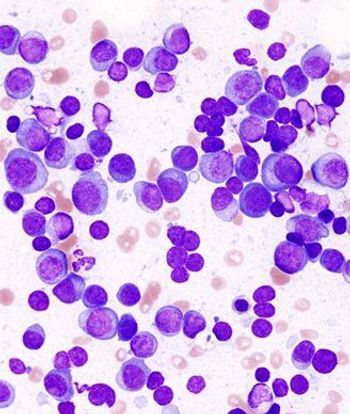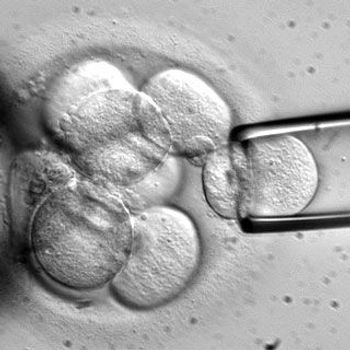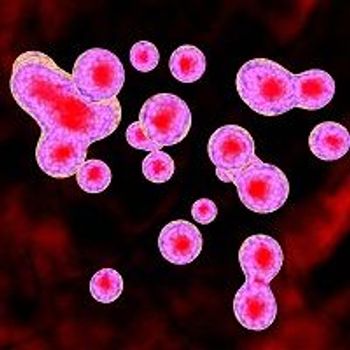
The European Commission has approved eltrombopag as a treatment for adult patients with severe aplastic anemia who are refractory to immunosuppressive therapy or are heavily pretreated and not suitable for hematopoietic stem cell transplant.

The European Commission has approved eltrombopag as a treatment for adult patients with severe aplastic anemia who are refractory to immunosuppressive therapy or are heavily pretreated and not suitable for hematopoietic stem cell transplant.

Barry Greenberg, MD, UCSD Sulpizio Cardiovascular Center, La Jolla, California, USA, presented results from the Calcium Up-Regulation by Percutaneous Administration of Gene Therapy in Cardiac Disease Phase 2b (CUPID 2) gene transfer study at the European Society of Cardiology 2015 Congress.

Patients with renal cell carcinoma (RCC) who have not responded to prior therapy may soon have a new treatment option.

A complex high-dose combination therapy is tolerable and effective in patients with aggressive B-cell lymphoma that has spread to the central nervous system.

Cabozantinib (Cometriq) has received a breakthrough therapy designation from the FDA for the treatment of patients with advanced renal cell carcinoma following one prior therapy.

The European Commission has approved the hedgehog inhibitor sonidegib (Odomzo) for the treatment of patients with locally advanced basal cell carcinoma (laBCC) who are not amenable to curative surgery or radiation therapy.

The FDA has approved the antibody-drug conjugate brentuximab vedotin as a consolidation therapy following autologous stem cell transplantation in patients with Hodgkin lymphoma who are at risk of relapse or progression.

Our standard therapies for peripheral T-cell lymphoma may cure a subset of patients, and thus far novel agents have not changed the outcomes for the majority.

Eighty percent of patients with advanced multiple myeloma had a clinical response to a new T cell–receptor therapy that used T cells to target cells expressing NY-ESO-1.

A number of clinical trials are now assessing PD-1 and PD-L1 inhibitors in combination with chemotherapy, targeted therapies, and radiation therapy in an attempt to further improve outcomes for patients with non–small cell lung cancer.

A new gene therapy could preserve vision in people with retinitis pigmentosa and might effectively treat other degenerative nerve disorders.

Oncologists now have a new tool for treating locally advanced basal cell carcinoma. On July 24, 2015, The US Food and Drug Administration (FDA) approved sonidegib (Odomzo) to treat patients with this type of cancer after it has recurred following surgery or radiation therapy.

The FDA has granted a breakthrough therapy designation to lenvatinib as a potential treatment for patients with advanced renal cell carcinoma who have received a VEGF-targeted therapy.

The US Food and Drug Administration recently approved sonidegib (Odomzo/Novartis) to treat patients suffering from locally advanced basal cell carcinoma – the most common form of advanced skin cancer – that had recurred post surgery or radiation therapy.

A group of researchers at Washington University in St. Louis recently opened a clinical trial to evaluate pembrolizumab as treatment intensification therapy for patients with high-risk locoregionally advanced, previously untreated, HPV-negative head and neck squamous cell carcinomas.

The FDA has granted a breakthrough therapy designation to the combination of the BRAF inhibitor dabrafenib and the MEK inhibitor trametinib as a potential treatment for patients with BRAFV600E-mutant non-small cell lung cancer.

Scientists have, for the first time, transplanted lab-grown stem cells, successfully restoring a brutally damaged liver's organ function.

Chronic pain is just one of many conditions that may be treated with an innovative stem cell-based therapy, according to researchers at Duke University.

Gene therapy to treat choroideremia is one step closer to reality thanks to a new study.

Rolling submission of a new drug application for rociletinib has been initiated for patients with EGFR T790M-positive metastatic non–small cell lung cancer following prior treatment with an EGFR-targeted therapy.

Non-viral gene therapy can temporarily reduce painful diabetic neuropathy, according to research from Northwestern Medicine.

Infusions of CTL019 achieved durable responses and showed an acceptable safety profile in heavily pretreated patients with CD19-positive non-Hodgkin lymphoma.

The CD19-targeted chimeric antigen receptor T-cell therapy CTL019 demonstrated early evidence of activity and safety in patients with refractory multiple myeloma.

Experimental stem cell therapy using a patient's own stem cells could offer long-term relief for many patients with multiple sclerosis, though questions still remain regarding cost, patient selection, and efficacy.

Twelve of the nation's leading oncology physicians, researchers and academicians were recognized by their peers as the 2015 Giants of Cancer Care at a ceremony hosted by OncLive at the Chicago Illuminating Company last night. The awardees included medical pioneers selected by a panel of eminent oncologists for landmark achievements in translational research, gene therapy, immuno-oncology and other groundbreaking work that has changed the course of cancer treatment.

Patients with EGFR-positive, non-small cell lung cancer (NSCLC) typically respond well to EGFR-targeted therapy, but eventually these tumors become resistant, leaving patients few options other than palliative care.

German health authorities are debating whether the price of Europe's first approved gene therapy is worth the $1 million price tag.

For women with hormone receptor-positive breast cancer, the decision to undergo adjuvant chemotherapy following endocrine therapy has important implications to health and well-being. Now, a gene signature assay may help clinicians make more precise recommendations and there are new guidelines to reflect that.

Our institutional experience confirmed that SBRT to primary NSCLC is well tolerated and provides excellent LC, regardless of tumor size or histology. Tumor density did not appear to have a significant effect on PTC, but denser tumors were more likely to have poorer outcomes, likely owing to associated larger tumor burden.

Cetuximab may be considered as an alternative to cisplatin with concurrent RT, particularly for patients with locally advanced head and neck squamous cell carcinoma who are not candidates for platinum therapy. These results indicate no difference in patterns of local or distant failure between cetuximab, low-dose weekly cisplatin, or q3 weekly high-dose cisplatin in this patient population.